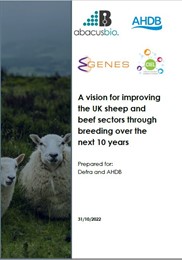The report presents evidence to inform decisions related to the development of the genetic improvement infrastructure for the UK sheep and beef sector, in order to improve financial sustainability and reduce environmental impact of the sector, including the current financial benefit of genetic improvement.
Key findings
For sheep:
- The historical rate of genetic gain will deliver annualised benefits of £14.7 million (net present value (NPV) of £183 million) over the next 20 years
- Historical environmental benefits in gross terms for sheep amount to -0.521 kg CO2e/mated female/year and -6,618 tonnes/all mated females/year. This represents a 0.1% reduction in gross emissions per year
- The scale of potential future economic benefits (NPV over 30 years) ranges from £328.1 million to £978.8 million, while the scale of improvement in future environmental benefits above status quo (based on historical trends) ranges from 69.1% to 249.1% and 34.4% to 180.4% in gross and intensity terms, respectively
For beef:
- The historical rate of genetic gain will deliver annualised benefits of £6.8 million (NPV of £84 million) over the next 20 years
- Historical environmental benefits in gross terms for beef amount to -3.38 kg CO2e/mated female/year and -5,000 tonnes/all mated females/year. This represents a 0.08% reduction in gross emissions per year
- The scale of future economic benefits (NPV over 30 years) ranges from £182 million to £291.3 million, while the scale of improvement in future environmental benefits above status quo ranges from -13.3% to 60.9% and -4.3% to 74.5% in gross and intensity terms, respectively
Future options
The future options assessment suggests that there is significant value to be gained by enhancing the genetic improvement programme for sheep and beef in the UK. This is particularly apparent for options that build a national genetic improvement infrastructure with an existing platform, or provide for a national genetic improvement infrastructure with a new UK platform. Further consultation is required to clearly identify the most appropriate option.
Cost–benefit ratios suggest that significant benefits are available through implementation of an integrated national phenotype and genotype collection programme. Nevertheless, it was noted that there are high levels of benefit available to industry through increased selection intensity and greater adoption, regardless of underlying trait and technology implementation. To fully realise the economic and environmental benefits that can be obtained by improving recording practices, increasing selection intensity and greater adoption are key.
Genetic improvement has a cornerstone role to play in driving the sustainability of the UK sheep and beef sector, including as a key tool in the response to the climate challenges the sector faces.
Any national phenotype and genotype collection programme should focus heavily on building a resource to deliver genetic gain for core genetic traits, as they offer significant opportunity to drive economic and environmental benefits.
Investment, supported by detailed business planning, should be made to develop a future programme that aspires to maximise the economic and environmental benefit of genetic improvement in the UK sheep and beef sector.
Further information about the project is available here
 Summary
Summary